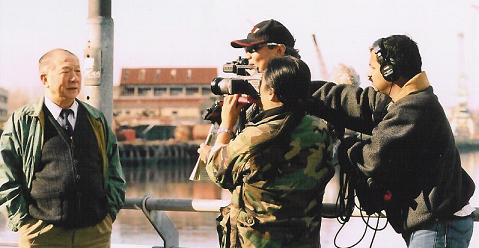Boca Junior
Buenos Aires, Argentina
July 28, 2003
La Boca is the underbelly of Buenos Aires and the roots of that melancholic dance, tango. Despite the tourist developments in the area, the hardcore dockyard ghetto still hovers around the parameters of the neighbourhood. We are repeatedly warned by police to be careful exposing our equipment in public as I was also warned on my previous trip. But I felt no threat or tension wandering these streets. In terms of class, there’s a parallel connection with the working class neighbourhood that I grew up in. I like to think that there’s a special unspoken bond and respect between working class brothers that crosses over borders of race and nationhood.

As we stroll by Boca Juniors’ stadium, I’m reminded of an incident from my research visit last Christmas. Maria had given me a Boca Junior jersey for Christmas. Not understanding the local soccer politics, I mistakenly wore it to visit her cousins up in the yuppie neighbourhood of Olivia. I was verbally abused although I didn’t know what they were saying since I spoke no Spanish. But I was pretty sure those were “fightin’ words”. Some even threw things at me from moving vehicles.
Maria’s father, an avid Boca Junior fan, later told me that the yuppies are chickens and would never dare to confront a Boca fan. They would only cowardly shout profanity at me from a distance. Apparently, Boca Juniors are a fierce and violent team.
Maria also told me that yuppies would be afraid of me for the simple superficiality of being Chinese. They’re apparently under the impression that the Chinatown in Belgrano is a dark and sinister place lurking with Taiwanese triads because that’s all they get from the media. I found out later that day that her cousin didn’t even know where Chinatown was and he’s lived in Buenos Aires all his life. I just hope that they had seen Sidney in “Guess Who’s Coming To Dinner” and I wasn’t too colourful a guest last Christmas… wonder if they hid their kitchen cleavers.
We brought Chiang for another interview in front of Puente Nicolas Avellaneda that Cheuk calls the Wong Kar-wai bridge because Wong had staged it in “Happy Together”. We continue interviewing Chiang at a local restaurant and I managed to catch some nice sequences of the lonely old man as he gazes melancholically while a young couple performs the tango for him, as if exclusively, in the empty restaurant.
From my fruitless cruising of the gay bars on my research visit last Christmas, I would say, this is probably as close as I’ll get this asexual lonely old man with two left feet onto the dance floor. Nonetheless, it is a perfect mirror image of those bygone dockyard immigrants who use to drink and dance the night away searching for a fleeting moment of love while yearning for their true love back home.
